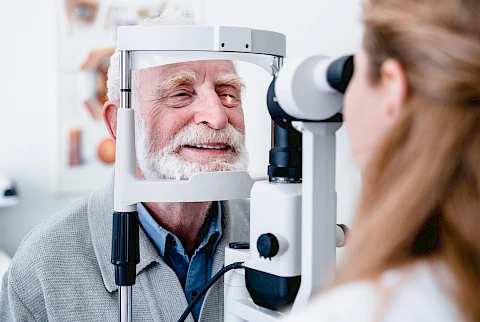
Diabetic retinopathy is a condition that affects the eyes of people with diabetes. It is a common complication but a serious one. Awareness is especially important for seniors and their caretakers because early detection can make a big difference in managing this eye disease. Senior Helpers Woodstock will take you step-by-step through understanding the stages of diabetic retinopathy. We aim to arm you with the knowledge you need to safeguard your precious sight.
What is Diabetic Retinopathy?
Diabetic retinopathy occurs when high blood sugar levels damage the small blood vessels in the retina, the portion of the eye responsible for detecting light and sending signals to your brain. Over time, these blood vessels can swell, leak, or become blocked, affecting your vision. Diabetes is the main risk factor for this condition.
Stages of Diabetic Retinopathy
Understanding the stages of diabetic retinopathy is key to taking control and acting swiftly. Mild nonproliferative retinopathy is the earliest stage. Small areas of swelling appear in the retina's blood vessels. At this point, you may not notice any changes in your vision, which makes regular eye exams so critical. Early detection can help manage progression and preserve your sight.
The next stage is moderate nonproliferative retinopathy. As the condition progresses, some of the blood vessels that nourish the retina become blocked. Vision changes may start to become noticeable, making frequent eye exams and monitoring any changes closely necessary.
During severe nonproliferative retinopathy, more blood vessels are blocked, depriving areas of the retina of their blood supply. This lack of nourishment signals the body to grow new blood vessels. However, these new vessels are often weak and problematic. Be alert to sudden changes in vision, as these are critical warning signs.
The most advanced stage is proliferative diabetic retinopathy. The new blood vessels that have formed are fragile and can bleed into the eye, causing vision loss. Scar tissue can form, leading to further complications like retinal detachment. Medical intervention is urgent at this stage to prevent severe loss of vision.
Regular Eye Exams and Working With Eye Care Professionals
Regular eye exams are the frontline defense in catching diabetic retinopathy early. For most seniors, an annual exam is recommended, but those with diabetes may need them more often. These exams help not only in detecting issues early but also in monitoring the progression of the condition, which can guide necessary adjustments in treatment plans.
Building a relationship with your eye care professional is fundamental. They are your allies in managing diabetic retinopathy. Work together to create a personalized plan that fits your specific needs. Ask questions during your appointments. Some important questions to consider are: What can I do to prevent progression? How will my diabetes affect my vision long-term? What should I do if I notice changes in my vision?
Contact Senior Helpers for Senior Care and Support
Diabetic retinopathy is a serious concern, but you can protect your vision with early detection and proper management. Regular eye exams, coupled with a strong partnership with your eye care professional, play essential roles in effectively managing this condition.
Don't wait for vision changes to take action. Be proactive and take steps today to safeguard your eyesight. For senior care support and assistance in Alpharetta, Cumming, Ball Ground, Canton, and Woodstock, contact us at Senior Helpers Woodstock.